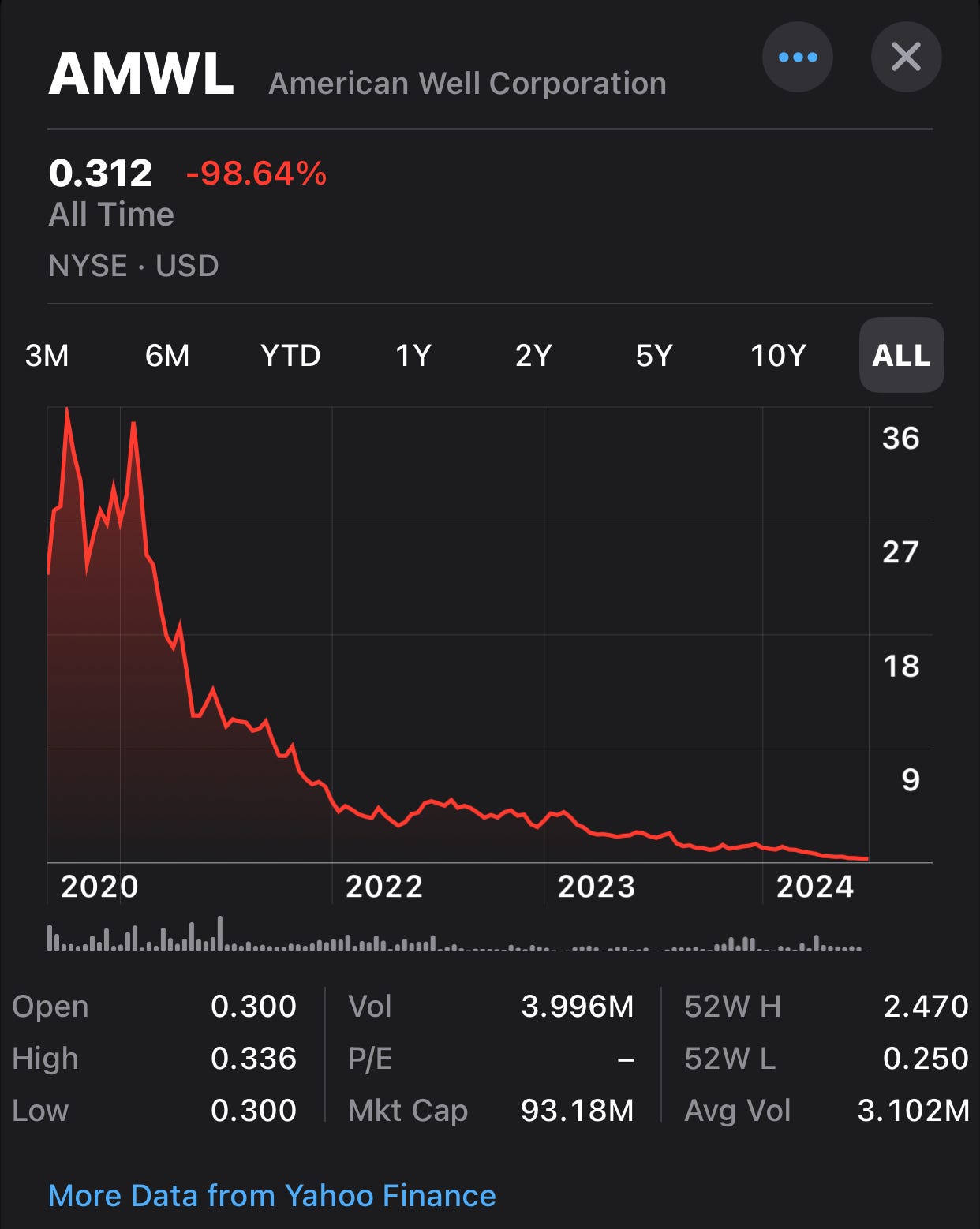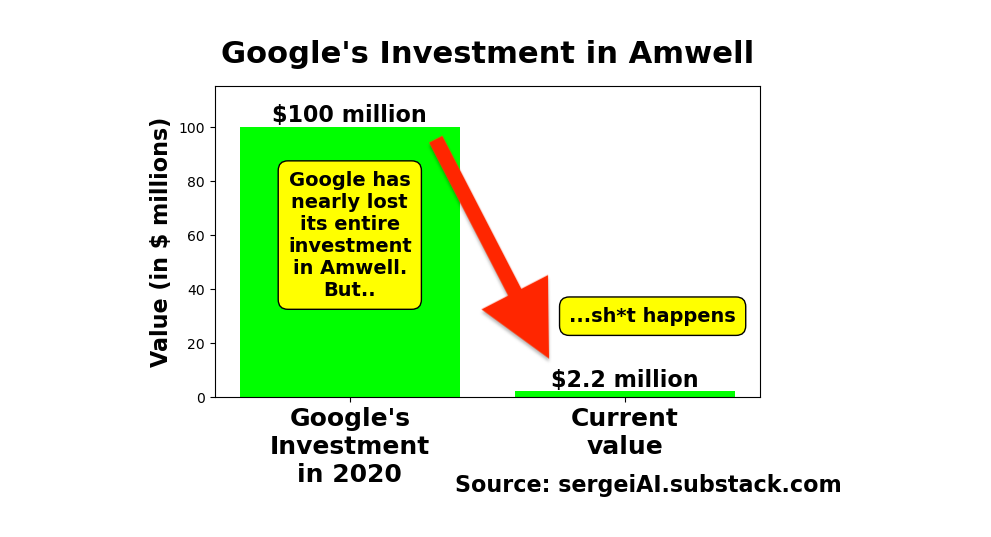COVID Finally Killed Amwell
The irresponsible $2 billion pandemic-era overspending has reduced the "Amazon of Healthcare" to ashes.
Welcome to AI Health Uncut, a brutally honest newsletter on AI, innovation, and the state of the healthcare market. If you’d like to sign up to receive issues over email, you can do so here.
We live in the time of destructive innovation. Except, unlike other industries, there is no true innovation in digital health. Everything seems to be destructive. 😉 Nothing is holding water. It’s very disturbing.
As I wrote on November 17, 2023 (The Telehealth Masquerade: How Corporate ‘Geniuses’ Sold Us the 1876 Wine in a New Bottle ), January 1, 2024 (Digital Health 2024: 7 Predictions & 50 Names You Don’t Want to Miss), February 21, 2024 (Livongo Killed Teladoc), and April 8, 2024 (Livongo Killed Teladoc, Part Two: CEO Out), the telehealth masquerade is over. We were all scared to death during COVID and were throwing any money at whatever started with “tele…” or “AI”. But financializing telehealth as a standalone commodity had to come to a halt one day. I just didn’t expect that day to come so quickly.
Telehealth should be viewed as an integral component of comprehensive patient care, not as an isolated service.
Amwell, originally known as American Well, has folded faster than anyone expected. Will anyone offer a lifeline to Amwell? Google? Allianz X? Takeda? I doubt it. I explain why.
Here is the outline of the article:
1️⃣ My 30-Second Encounter With Amwell 😊
2️⃣ Google’s $100 Million Bet on Amwell Evaporates. Poof... 🪄
3️⃣ Another Telehealth Magic Trick: Glen Tullman’s $18.5 Billion Lemon Sale of Livongo to Teladoc Shareholders
4️⃣ The “Amazon of Healthcare”
5️⃣ Amwell’s 1.9-Star Customer Reviews
6️⃣ Amwell’s Biggest Customers
7️⃣ VC Bros’ Magic Trick: Pump, Dump, Disappear
8️⃣ The ‘Champagne and Cocaine’ of COVID Overspending: The Telehealth Crash
9️⃣ Amwell’s Volatility and Illiquidity: A 1999 Internet Startup Vibe from the Parents’ Basement
🔟 Splitting Shares Is Worse Than Splitting Hairs
1️⃣1️⃣ Amwell’s Survival Scenarios: Slim Pickings
1️⃣2️⃣ My Thoughts on the Telehealth Market in 2025 and Beyond
1️⃣3️⃣ Conclusion
Enjoy!
1. My 30-Second Encounter With Amwell 😊
On July 26, 2020, I reached out to Amwell, offering a partnership between my startup’s AI technology and their telehealth platform. Our tech streamlines the intake process and guides clinicians and patients through telehealth visits. Amwell’s response? A generic message from an outsourced service, LiveHealth Online support: “Hi Sergei, Thank you for reaching out to Amwell. I have passed your contact information to our corporate development team, who will be following up with you if interested in a partnership.”
Spoiler alert: no one got back to me. They were probably too busy prepping for their IPO on September 17, 2020.
2. Google’s $100 Million Bet on Amwell Evaporates. Poof... 🪄
I didn’t realize it at the time, but they already had Google’s $100 million investment locked in, thinking they would get all sorts of tech goodies from the tech giant. 🤦♂️
But Google never really cared to do anything for Amwell besides the investment and the opportunity to migrate Amwell’s cloud business to Google Cloud from Amazon Web Services (AWS).
Long story short, Amwell never developed any AI capabilities whatsoever.
Let me pause here for a second. Most people don’t realize how tech giants like Google and Microsoft invest in healthcare. These corporations sprinkle a little bit of money ($100 million is a drop in the bucket for Google) across multiple startups in diverse areas: telehealth, mental health, AI, therapeutics, etc., and see what sticks. It’s like playing pin the tail on the donkey while blindfolded. Most of the time, the tail doesn’t fit, but they are waiting for that one big time when it finally fits.
So, at Amwell’s IPO, on September 17, 2020, Google invested $100 million in Amwell. Since that day, Google’s $100 million has fallen 98% to a mere $2.2 million. Didn’t work out for Google, but life goes on.
Keep reading with a 7-day free trial
Subscribe to AI Health Uncut to keep reading this post and get 7 days of free access to the full post archives.







